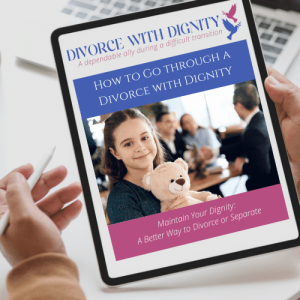Nobody wants to get a divorce. In situations when it becomes inevitable, it’s much better to have one where everyone gets what they want with a minimum of pain and arguing and can walk away without going back to court over and over again.
The solution is an amicable divorce. Sometimes known as an “uncontested” divorce or simple divorce, this divorce process lets both parties divide their property, discuss child support and visitation, and make other critical decisions themselves, without the stress and cost of litigation.
Overview of amicable divorce
An amicable divorce resembles a traditional divorce in some ways. There is still a petition and a response. The parties must still file financial disclosures if required by their state. Parties may need to appear in court for the judgment. However, in many other ways it is quite different.
In amicable divorce, the parties agree they will work out all disputes and agreements among themselves. They can agree to disregard state regulations about property division and divide things in the way that best suits their needs. For instance, in a community property state, all marital property belongs to both parties, and the court divides it equally between them. In an amicable divorce, the couple may divide their property however they like, as long as both are satisfied. The only time a couple may have to seek court approval is in child support. Many states have minimum guidelines for child support, and the judge cannot go below those figures. However, couples can agree to deviate as long as the children are adequately provided for.
During an amicable divorce, difficulties are managed with the assistance of a mediator. Like a judge, a mediator is neutral. Unlike a judge, a mediator is not there to decide which party should “win.” The mediator helps the parties come to a reasonable solution and see any flaws or sticking points. A mediator may also suggest alternatives that the couple may not have thought of and point out alternatives that may seem feasible.
How it differs from traditional litigation
Traditional litigation is sometimes called “adversarial” litigation. The parties meet in court, and one side tries to beat the other. It resembles any other court case, where one side must be “right” and the other must be “wrong.” This pits the couple against each other, and leads to fights over everything, right down to household items and child custody dates.
During traditional litigation, any disputes must be settled by the judge. For instance, the parties must exchange tax returns and bank statements, even if they have the same sets of paperwork. This frustrates both parties and can lead to irritation as both parties want to know why they must give the other side paperwork they already have. If one side refuses to produce their documents, the other must petition the judge for an order to compel production.
The judge sets a hearing on the motion, and the parties come to court to argue about whether the request is reasonable or not. After the hearing, the judge may make a decision immediately, or issue an order later. This process can take weeks or even months. While you wait, you and your spouse will continue to be frustrated and angry at each other and the process.
In an amicable divorce, the parties agree in advance that any disputes will be negotiated among themselves. If one party does not have the requested documents, or cannot produce them, the spouses (and their attorneys, if applicable) will talk the matter over and decide whether the material is necessary to the case.
Amicable divorce can also be faster than a traditional divorce. Since the process lets parties make informal agreements to documentary evidence, witness statements, and financial information, there’s no need to wait on court hearings. Rather than waiting for the next court date—which could be three months away—parties can move quickly to a resolution.
Couples who use amicable divorce find that their post-divorce relationship is better as well. Since they’re both equally involved in the decision-making process, both parties are invested in making things work. This differs from being told what to do by an authoritative judge. Sometimes it’s the thought of being ordered to comply that makes people angry, and being able to decide for themselves makes all the difference.
Some Caveats
Amicable divorce will only succeed if both parties want it to. Both parties (their attorneys, if applicable) and their mediator must be committed to the process, and enter into the procedure in good faith. Agreeing to share documents, testimony, and evidence can only work when there is trust between the parties.
Amicable divorce is not recommended in cases where:
- There is or has been domestic violence
- There are allegations of child abuse or threats of child abduction
- One or both parties allege there has been financial fraud
- Either party has had substance abuse or mental health issues
Not all amicable divorces require attorneys. If the mediation process fails, the parties may need litigation attorneys if they have not had attorneys during the mediation. It’s a good idea to have an independent attorney review any settlement agreement before it is submitted to the court, but it is not required.
Final Thoughts
The DWD Providers consist of therapists, attorneys, mediators, independent paralegals, and legal document assistants understand how divorce can pull a family to pieces even when the spouses want to separate peacefully. We’re here to help make the transition as easy as possible. Our Providers help couples through the difficult steps of a dissolution and make it out the other side.
When it’s time to make the transition from one couple to two people, we’re here to help. We have the skills you and your family need for a successful amicable divorce. Let us help you and yours make their decisions without turning it into a courtroom battlefield. Our Providers are here to turn traditional litigation into an amicable situation for all parties.
Disclaimer: The author of this blog is not an attorney and the information contained in these blogs should not be considered legal advice. The information provided here is based on the experience of the author and some of her clients whose actual names are not mentioned. Do not hesitate to seek the advice of an attorney if you have any legal questions.


